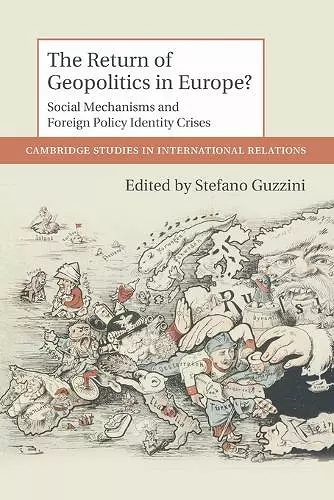The Return of Geopolitics in Europe?
Social Mechanisms and Foreign Policy Identity Crises
Format:Paperback
Publisher:Cambridge University Press
Published:22nd Aug '13
Currently unavailable, and unfortunately no date known when it will be back
This paperback is available in another edition too:
- Hardback£90.00(9781107027343)

A comparative study of the relationship between the end of the Cold War and the resurgence of geopolitics in Europe.
Analyses the relationship between the end of the Cold War and the resurgence of geopolitical thought in Europe. This book contributes to the analysis of the role of identity in foreign policy and its comparative approach allows for a broad assessment of some of the fundamental dynamics of European security.The end of the Cold War demonstrated the historical possibility of peaceful change and seemingly showed the superiority of non-realist approaches in International Relations. Yet in the post-Cold War period many European countries have experienced a resurgence of a distinctively realist tradition: geopolitics. Geopolitics is an approach which emphasizes the relationship between politics and power on the one hand; and territory, location and environment on the other. This comparative study shows how the revival of geopolitics came not despite, but because of, the end of the Cold War. Disoriented in their self-understandings and conception of external roles by the events of 1989, many European foreign policy actors used the determinism of geopolitical thought to find their place in world politics quickly. The book develops a constructivist methodology to study causal mechanisms and its comparative approach allows for a broad assessment of some of the fundamental dynamics of European security.
'A must-read for students of international relations theory, international security, and European studies, The Return of Geopolitics in Europe? by Stefano Guzzini and collaborators combines theory making, methodological innovation and comparative empirical analysis to deliver an outstanding and important book. This is not only because of the book's compelling answer to the puzzle of why a geopolitical school of thought began thriving in parts of Europe after the Cold War's peaceful end, but also as an exemplar of how excellent and rigorous constructivist theoretical and empirical research can and should be done.' Emanuel Adler, Andrea and Charles Bronfman Chair of Israeli Studies, University of Toronto
'The revival of explicit geopolitical thinking in Europe (and elsewhere) in the aftermath of the Cold War has not received much scholarly attention. Rather than just providing case studies, this book offers an innovative way of thinking about why such ideas arose more strongly in some European countries than in others and consequently provides an original sociological account of how the revival happened the way it did. It will be of wide interest to scholars in constructivist international studies, political sociology, and political geography.' John Agnew, University of California, Los Angeles, and author of Geopolitics: Re-Visioning World Politics
'Guzzini has put together a tightly argued study of how and why 1989 triggered a revival of geopolitical thinking in some European countries but not others. This book combines novel empirical cases with theoretical developments in constructivist process-tracing, and will be of particular interest both to those interested in comparative foreign policy analysis and those engaged with the impact of 1989.' Barry Buzan, Emeritus Professor of International Relations, London School of Economics and Political Science
'Stefano Guzzini and collaborators have produced a first-rate book that delivers on multiple fronts. Students of European politics will find thoughtful - and thought-provoking - analysis of the return of geopolitical thought in post-Cold War Europe. International relations theorists will gain new insights on how foreign policy starts at home. These substantive and analytic findings are then used to push constructivism in exciting directions - to new understandings and applications of methods (process tracing) and concepts (mechanisms) that for too long have been neglected by interpretivists. In sum, Guzzini's book delivers substantively, theoretically and methodologically - an all-too-rare trilogy in our profession!' Jeffrey T. Checkel, Simons Chair in International Law and Human Security, Simon Fraser University, and Peace Research Institute Oslo
'Guzzini's puzzle is an interesting one, which whilst set up against realist arguments in International Relations also speaks to research in Political Geography. Whereas some in critical geopolitics may have moved beyond foreign policy analysis and the book's self-diagnosed state-anthropomorphising conception of identity, the collection of essays included in the book are a must for any student of contemporary European geopolitics. Moreover, Guzzini's excellent discussion of realism and geopolitics could have made for a much-needed stand-alone journal article.' Ian Klinke, Political Geography
'There is much useful reflection in the first three chapters that rewards a close reading. This includes a consideration of the relationship of neoclassical geopolitics to realism in international relations … The case studies that follow are a significant strength of the book.' James D. Sidaway, Society and Space
ISBN: 9781107676503
Dimensions: 229mm x 152mm x 19mm
Weight: 500g
342 pages